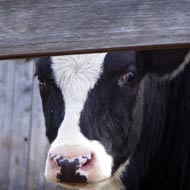
Call ahead of House of Lords debate on halal and kosher meat production
The RSPCA is calling for all animals to be stunned before slaughter, ahead of a House of Lords debate tomorrow (16) on religious animal killing.
In the UK, more than 900 million farm animals are slaughtered for meat every year.
The majority are stunned – rendering them senseless to pain or distress – before they are slaughtered
But the RSPCA says the law currently allows Jewish and Muslim communities to follow their own religious methods, without first stunning the animals.
A Food Standards Agency (FSA) animal welfare survey carried out in abattoirs across Great Britain in 2011, found most animals for halal meat were stunned first.
But none of the animals slaughtered for the kosher market were pre-stunned before slaughter. A proportion of meat killed this way is also declared non-kosher and is sold on the open market without being labelled as meat from animals slaughtered without being pre-stunned.
The RSPCA argues that while religious beliefs and practices should be respected, animals should only be slaughtered under humane conditions – and that meat should be labelled so consumers know whether this is the case or not.
Dr Julia Wrathall, head of the RSPCA’s farm animal science department said: “Farm animals deserve to be treated with care and respect throughout their lives, from the time they are born right up to their final moments in the abattoir.
“We want to see all animals rendered unconscious before slaughter.
"Until that time we are calling for clear labelling so shoppers are armed with information that can enable them to make an informed choice about whether they buy meat from animals which have not been stunned before slaughter.
“Until there is better, universal labelling, shoppers should look for the blue and white Freedom Food label.
"Meat produced under this RSPCA assurance scheme comes from animals inspected to the RSPCA’s farm animal welfare standards which do not permit slaughter without pre-stunning.”
Scientific research shows that not stunning animals first, can cause unnecessary suffering.
The FSA survey showed that more than 40 million cattle, sheep, pigs and calves and around 900 million poultry, are slaughtered each year in the UK.
Of those, some 3% of cattle, 10% of sheep and goats, and 4% of poultry were not stunned before slaughter.
David Bowles, head of public affairs for the RSPCA, has written a report for the House of Lords debate.
He said: “We know this is a subject that our supporters feel passionately about. We share their welfare concerns and that is why we have continued to campaign for religious slaughter to be discussed at the highest possible levels.”
The RSPCA believes mandatory labelling should be introduced so that all meat that has not been stunned is labelled and we will press for European rules on this in 2014.
The Animal Welfare Survey 2011 is available from the FSA website.
For more information on Freedom Food, the RSPCA’s higher welfare farm assurance scheme, visit www.freedomfood.co.uk.
More information on the RSPCA farm animal welfare standards, including the standards for slaughter and killing is available here.



 The Veterinary Medicines Directorate (VMD) is inviting applications from veterinary students to attend a one-week extramural studies (EMS) placement in July 2026.
The Veterinary Medicines Directorate (VMD) is inviting applications from veterinary students to attend a one-week extramural studies (EMS) placement in July 2026.